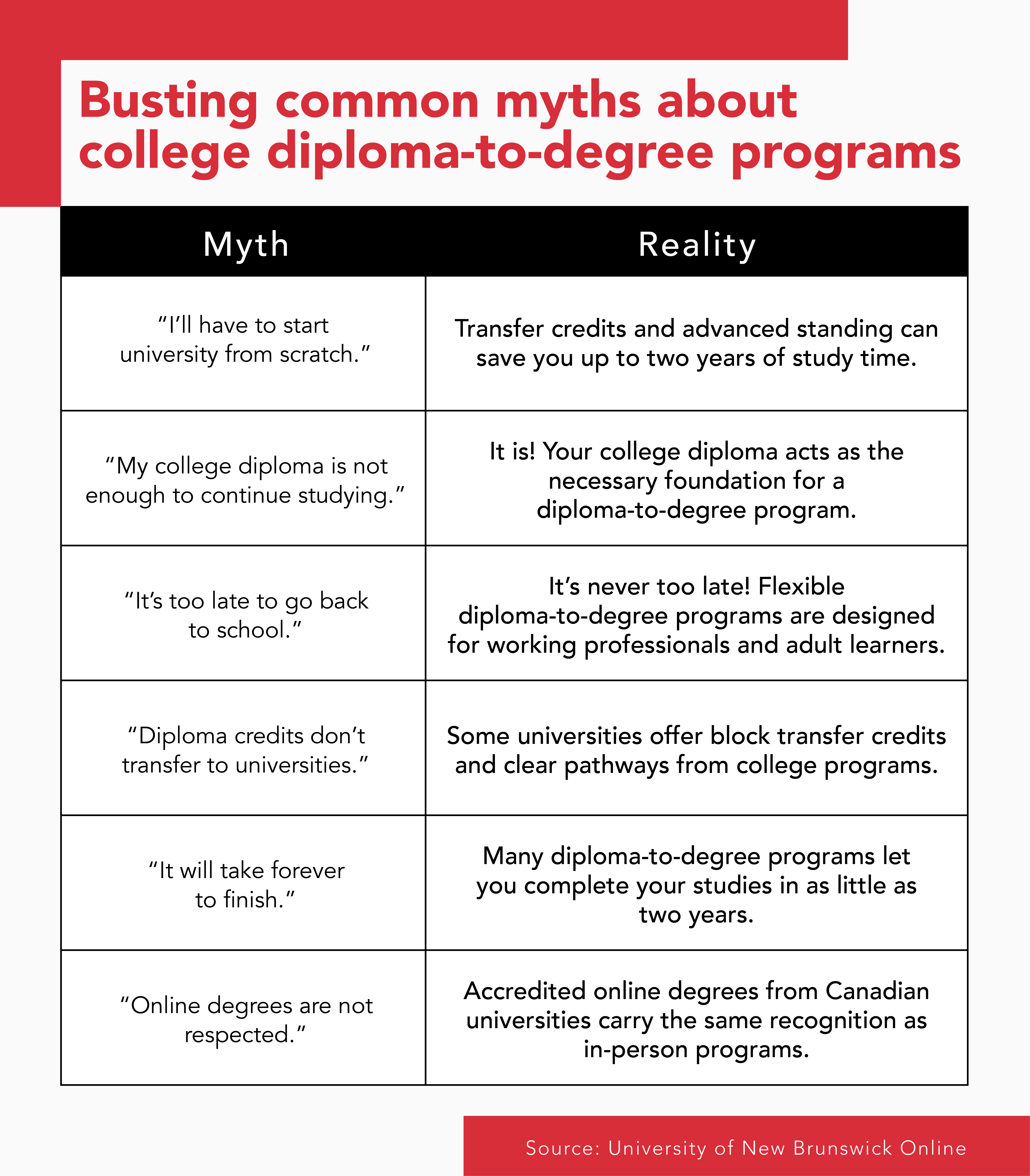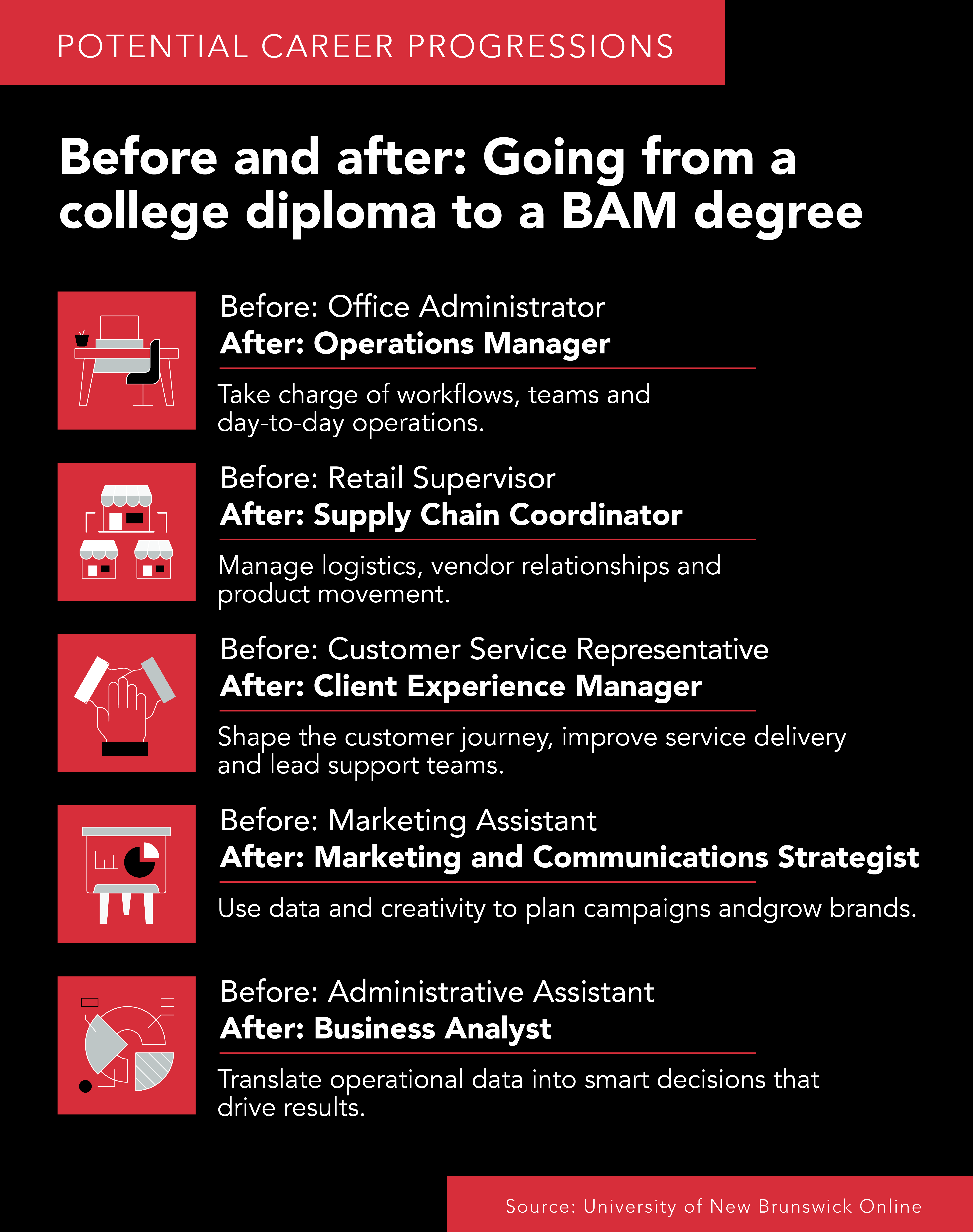Wondering what’s next after your college diploma? Converting it into a university degree could be your next big step, transforming your current credential into a more powerful platform for growth.
Maybe you’re looking to climb the career ladder, pursue a promotion or switch industries entirely. Perhaps you want to boost your earning potential, become eligible for a professional certification like the CPA or one day earn a master’s degree.
Regardless of your motivation, a college diploma-to-degree program can help you get there faster than you might think. Let’s break down how it works and how to make it work for you.
What is a college diploma-to-degree program?
A college diploma-to-degree program college diploma-to-degree program is a structured pathway that allows college diploma program graduates to earn a university bachelor's degree in a shorter time than traditional university students.
The importance of advancing your credentials is reflected in data from Statistics Canada which shows that individuals with a bachelor's degree had an employment rate of 74% in 2024, compared to 65.3% for those with a college diploma.
These degree advancement programs recognize your prior college education through transfer credit or advanced standing, meaning you may be exempt from repeating equivalent courses at the university level. In many cases, you can finish your degree up to two years faster, depending on how closely your diploma aligns with your chosen degree.
Programs are designed with career advancement in mind, often reflecting the practical, hands-on training college graduates bring. This isn’t about starting over. It’s about moving forward strategically and efficiently.

Why a college diploma-to-degree program could be your smartest move yet
When you’ve already invested time, energy and tuition into your college diploma, it makes sense to build on that foundation. A university degree doesn’t just signal more education; it can open the door to a wider range of opportunities, from leadership roles to eligibility for advanced studies.
An advanced diploma-to-degree program allows you to:
- Earn your bachelor’s degree faster, saving you both time and money. Higher credentials are also important from a career perspective, as the number of jobs requiring a bachelor’s degree in Canada has increased by 115% since 2015.
- Step into higher-paying roles or qualify for leadership positions in your field. According to Universities Canada, Canadians with a bachelor's degree earn 24% more than the national average.
- Meet the requirements for graduate programs, including MBAs or master’s degrees in health, tech or public policy.
- Pursue professional certifications, such as the CPA, PMP or CHRP, which often require a university degree.
Programs like the University of New Brunswick’s (UNB) Bachelor of Applied Management (BAM) are designed with diploma graduates in mind. The BAM is a fully online program that builds on your existing college education, helping you pivot into business-related roles without putting your life on pause.
If you’re already working or have family obligations, online options like this can make continuing your education not just possible but practical.
Top college diploma-to-degree program pathways across Canada
Canada has no shortage of universities offering pathways for college graduates to earn their degrees. These programs are often developed through partnerships or articulation agreements between colleges and universities, ensuring your diploma counts toward your next educational endeavour.
In many cases, schools offer bridging programs or accelerated degrees, which supplement your existing training with the academic credits required to meet a university’s bachelor’s degree standards.
Some of the most common fields for diploma-to-degree pathways include:
- Business and Administration. Whether your college diploma is in business, marketing, HR or even an unrelated field, programs like the Bachelor of Applied Management allow you to shift into roles like operations manager, business analyst or project coordinator. You’ll develop the leadership and strategic thinking skills needed to step into supervisory or administrative positions.
- Information Technology. For college diploma holders in software development, networking or IT support, universities offer tech-focused degree pathways that deepen your understanding of theory and open doors to roles in systems analysis, cybersecurity or IT project management.
- Healthcare and Nursing. If you have a diploma in practical nursing, health sciences or healthcare administration, you may qualify for accelerated pathways into degrees that lead to public health roles, healthcare leadership or advanced clinical practice.
- Engineering Technology. College diplomas in civil, electrical or mechanical technology can often transfer into degree programs in engineering or applied science, helping you qualify for jobs with a professional designation or senior project responsibilities.

Streamline your future with transfer credit and advanced standing
One of the most compelling reasons to pursue a college diploma-to-degree program is the potential to carry over your previous coursework. This recognition can significantly shorten your time to graduation and reduce your financial burden.
Transfer credits are typically awarded when your previous courses match those required by the university degree. In some cases, universities offer block credit transfers for programs with established articulation agreements, which means a large portion of your college diploma is accepted.
Conversely, advanced standing allows you to skip introductory university courses because your college background proves you’ve already mastered the content.
Tips to get the most out of your transfer credits
Transfer credits can make a major difference if you’re planning to turn your college diploma into a university degree. They not only save you time and tuition but also ensure that the work you've already done counts toward your future goals. To take full advantage of it, it’s important to be strategic and prepared.
- Choose a degree program that closely aligns with your college diploma for the highest chance of transfer credit.
- Provide complete transcripts and course descriptions, especially if requested.
- Look for schools with established transfer pathways, like UNB’s BAM program, which clearly outline how your diploma transfers into degree progress.
- Talk to an academic advisor or admissions rep early in the process to get a personalized assessment and avoid surprises.
By approaching the transfer credit process with the right information and a clear plan, you can maximize your previous education and minimize the time it takes to graduate. A little effort upfront can pay off in a big way down the line.
Find the university degree program that fits your goals and your life
Not all degree programs are created equal, especially when it comes to accommodating working professionals or adult learners. As you consider your next steps, think beyond the credential and ask yourself what kind of program suits your life.
Are you looking to move into business leadership, public service or healthcare management? Choose a program that aligns with those goals.
Need flexibility? Look for online or part-time diploma-to-degree options, such as those offered at UNB online, that allow you to keep working while studying. Research from Universities Canada and The Canadian Association for University Continuing Education (CAUCE) shows that adults in flexible or tailored university programs are more than twice as likely to finish their degrees compared to those in traditional formats.
Finally, seek out schools that value your experience. Some may offer prior learning assessments, giving you credit for on-the-job training or certifications.
What international applicants need to know before applying
If you earned your college diploma outside of Canada, converting it to a Canadian degree is still very much on the table. There are just a few extra steps.
First, confirm that your credential is equivalent to a Canadian college diploma. Services like WES (World Education Services) or ICAS (International Credential Assessment Service) can evaluate your transcripts for Canadian equivalency.
Be prepared to:
- Submit certified translations of transcripts if they aren’t in English or French
- Meet language proficiency requirements, such as minimum IELTS or TOEFL scores
- Choose online programs if you're planning to start your studies from abroad
The good news? Once accepted, you’ll gain access to Canadian degree recognition and a wider world of career or immigration opportunities.
Your roadmap to a smooth college diploma to degree transition
Making the leap from college diploma to university degree is exciting, but like any important move, it requires some planning. Knowing what to expect and what steps to take can make the entire process smoother and less overwhelming.
- Start your research early. Compare diploma-to-degree programs, delivery formats and credit transfer policies.
- Pay close attention to application deadlines and admission requirements.
- Look into financial aid, scholarships or bursaries for mature or continuing education students.
- Reach out to university admissions offices with your questions, as they’re there to help.
- Read student testimonials or alumni stories to see how the program has helped others in your shoes succeed.
With the right preparation and support, your transition to a university degree can be straightforward and empowering. Take it one step at a time, ask questions, and stay focused on your end goal: a degree that opens new doors and builds on everything you've already accomplished.
Turn your college diploma into a degree – 100% online
If you hold a college diploma, the Bachelor of Applied Management (BAM) from UNB Online could be your next step. This fully online program is specifically designed for diploma grads like you, offering advanced standing and generous transfer credit opportunities to help you complete your degree faster.
Whether you're looking to qualify for leadership roles, earn more or build a bridge to graduate studies, UNB’s BAM program gives you the flexibility to achieve your goals on your own schedule. Get more program information or begin your application today.
Your potential brought you here. Let your progress carry you forward.

